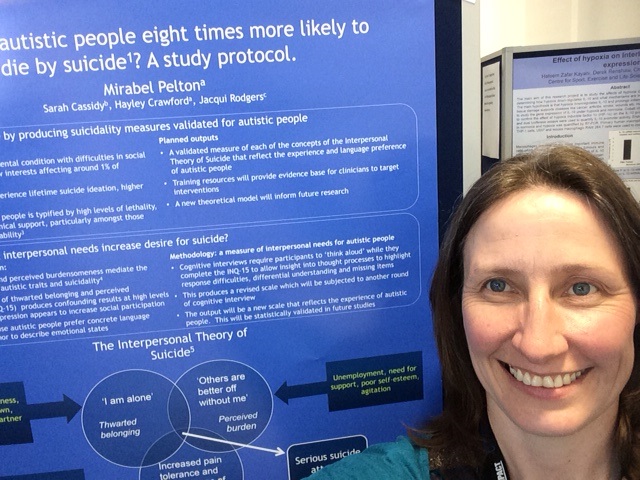It is the nature of post-graduate work that people are dotted around in different locations. They may be in different offices, different buildings, or even off-site. We at the Newsletter feel it is important for post-grads to get to know each other, especially as we all have vastly different topics. As a result, we have designed this section as a short introduction to read a little about researchers who have chosen to answer a few questions about themselves.
We will be placing the spotlight on a new researcher every month, so you can get to know their topic a little better and hear some of their advice and recommendations. If you want to be under the spotlight, address your email to either James Bartlett or Sarah Charles. The latest post-grad under our spotlight is Sahar Shahid, a forensic psychology PhD student.
Mirabel Pelton

What is your thesis title (or working title)?
Understanding and reducing suicidality in autistic adults: tests of the Interpersonal Psychological Theory of Suicide
In 50 words, how would you explain your thesis to dummies
Research suggests that autistic people are more likely to think about, attempt and die by suicide than those with neurotypical development but we don’t know why. My research aims to understand how the experiences of autistic adults lead to suicidal thoughts and behaviours.
Why did you choose your thesis topic?
My MSc reported that autistic traits in the general population are significantly associated with suicidality through feelings of social disconnection and feeling like a burden on others and this effect remained at high levels of autistic traits (Pelton & Cassidy, 2017). My PhD research extends this work by exploring these associations in diagnosed and possibly (non-diagnosed) autistic adults. Autistic people experience mental health difficulties due to the stigma and poor understanding of autism. Suicide is a major cause of premature mortality but receives relatively little attention compared to other public health concerns. I hope that my research will make a difference to those who experience these difficulties. As an aside, please consider completing my online survey. You can take part if you are autistic, not autistic or think you might be autistic. The more people who complete the survey, the stronger evidence I can present.
The survey is available at https://tinyurl.com/ygcd98pe and more information about my research can be found at https://sites.google.com/view/mentalhealthinautism/projects/phd-research.
Looking back, what advice would you give to yourself in the first three months of your research degree?
The first 3 months of my PhD were challenging because I suddenly experienced many of the themes of my proposed research within my immediate family. This was a shock as I was unaware of either autism or mental health difficulties in my family. I considered suspending but found it difficult to work out what to do for the best as I hadn’t really started. As with all aspects of a PhD, my supervisors were an invaluable source of support and guidance but they do not have all of the answers. It was up to me to decide what to do.
Advice I would give myself would be to read into how the university may deal with edge-cases like mine. Supervisors are good at knowing more general information, but they are not always knowledgeable about specific processes for people in all situations.
If anyone else finds themselves in unexpected life events I’m happy to share my experience of ‘the system’.
For reading are there any books you think the readers might enjoy? It doesn’t have to be academic in nature, just a good book you’ve read.
I think it’s really important to read for pleasure as well as for my PhD. This year, I plan to read ‘The Boy who was Raised as a Dog’, stories by child psychologist Bruce Perry and ‘Blood Orange’ a psychological thriller by Harriet Tyce.
They’re both heavily promoted on Twitter so perhaps we should form a book club and discuss?
What is something you do for fun when not focussing on your research degree?
Personally, my PhD is where I get my ‘me time’. It is a distraction from my childcare responsibilities and my research assistant work at University of Birmingham. Beyond that, if I get 5 minutes to myself, I go to my allotment, dig in the mud and plant seeds that tend not to grow into vegetables. Our allotment has the added benefit of a bar where you can relax with a pint afterwards…